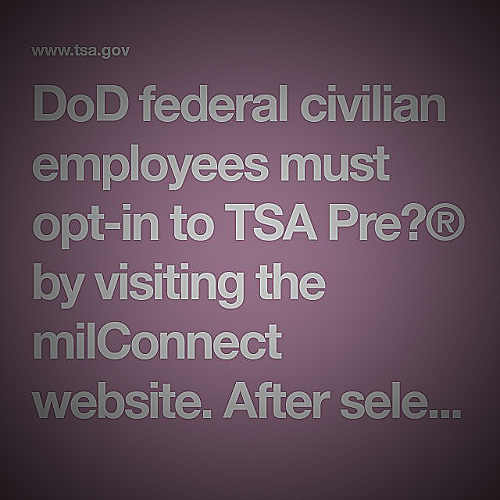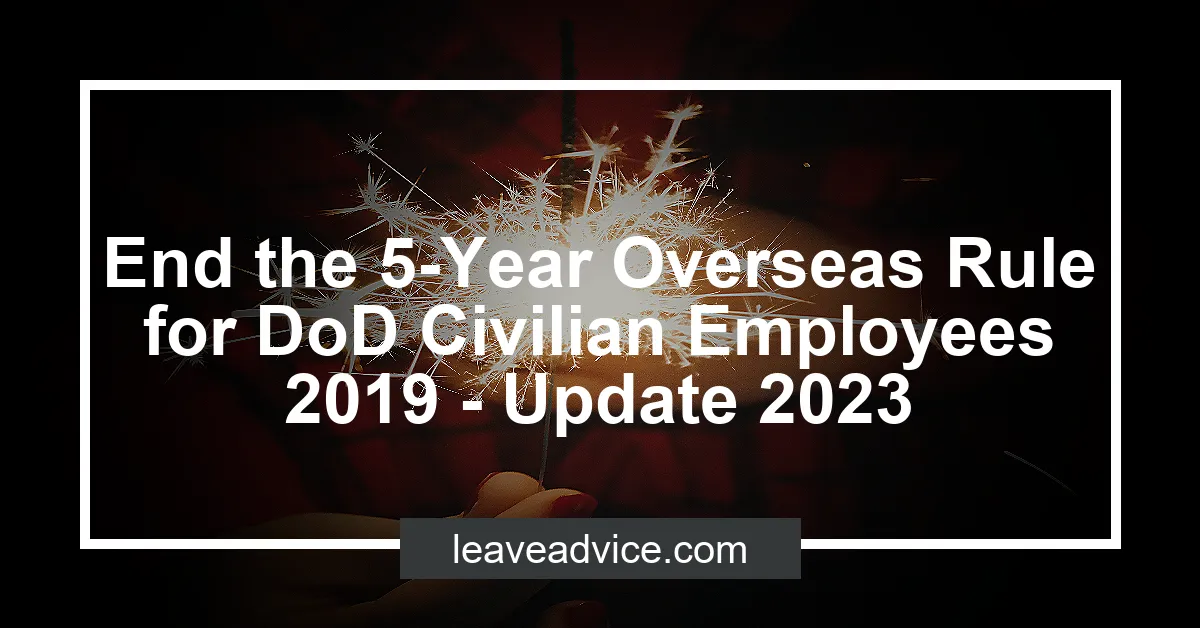End the 5-Year Overseas Rule for DoD Civilian Employees 2019 – Update 2023
This article tackles the issue of the 5-year overseas rule for DoD civilian employees and the call to end it in 2019. This rule, which is stipulated in the Return Rights Agreement, allows employees serving overseas to hold their position or a like position for five years upon their return.
However, there is a growing concern among employees and advocates that this rule is affecting their career progress and opportunities. This article discusses the reasons why ending the rule is necessary and how it can benefit the civilian workforce.

The Background of the 5-Year Overseas Rule for DoD Civilian Employees
The 5-Year Overseas Rule, which has been in effect since 1960, provides DoD civilian employees with a Return Rights Agreement that guarantees that their position (or a similar position) will be held for their return from the overseas area for a period of five (5) years. This agreement is designed to ease the transition of employees back to the United States after several years of overseas duty.
The rule was initially put in place to ensure that civilian employees could retain their jobs and benefits while serving their country abroad. The agreement offers them some security while they are stationed in a foreign country, as it enables them to return to familiar positions upon completion of their duty.
Over the years, the 5-Year Overseas Rule has been extended and updated to reflect changes in the Defense Department’s personnel policies.
Statistics show that the number of DoD civilian employees stationed overseas has decreased over the past few years. As of December 2019, there were approximately 186,000 DoD civilians working overseas, compared to roughly 217,000 in 2014.
Despite this decrease, many employees still rely on the 5-Year Overseas Rule to protect their jobs and aid in their reintegration into American society.
However, there have been calls to end the 5-Year Overseas Rule for DoD civilian employees. Critics argue that the rule is outdated and that it gives employees an unfair advantage over other workers who are not given similar protections.
Some also contend that the rule discourages employees from seeking promotions, as they may be hesitant to leave their positions and risk losing their return rights.
An image that highlights the issue of the 5-Year Overseas Rule could be a graphic showing the number of DoD civilian employees stationed overseas over the years. The alt text for the image could be “Chart showing the number of DoD civilian employees stationed overseas over the years.
Challenges of the 5-Year Overseas Rule for DoD Civilian Employees
The 5-year overseas rule for DoD civilian employees poses various challenges and problems. One of the most significant challenges is the difficulty of transitioning back to a domestic position after spending five years or more overseas.
Employees may struggle to readjust to civilian life and find it difficult to secure employment after their overseas mission is completed.
Another challenge is the impact on family life. Families of DoD civilian employees who are overseas for five years or more may face significant difficulties related to separation from extended family, health care issues, and educational needs of dependents.
The 5-year rule can also lead to the loss of valuable experience and expertise for the Agency. If an employee is required to stay overseas for a prolonged period, their specialized skills and knowledge may become outdated, making it difficult for them to transition back to their previous role or a like position when they return.
The 5-year overseas rule can also affect employee morale and motivation. If an employee knows that they will not be able to return home for five years or more, they may feel a sense of isolation and become disengaged from their work.
Furthermore, the 5-year overseas rule can result in a shortage of skilled personnel in the domestic workforce. If skilled personnel are unable or unwilling to take overseas assignments due to concerns about the length of time they will be away from home and the challenges that come with it, the Agency may struggle to fill positions.
An example of the challenges posed by the 5-year rule is the case of one DoD civilian employee who took an overseas assignment but found it difficult to return home and resume their career after the five-year period. The employee struggled to find a suitable position and had to turn to a different career path outside of the DoD.

Overall, the 5-year overseas rule for DoD civilian employees brings various challenges and problems not only to the employee but also to the Agency. It is essential to consider the long-term effects of this rule and to find solutions that balance the needs of the employee and the Agency.
Arguments for Ending the 5-Year Overseas Rule for DoD Civilian Employees
There are several arguments in favor of ending the 5-year overseas rule for DoD civilian employees. The main argument is that the rule limits the effectiveness of the DoD’s overseas workforce by forcing experienced employees to leave after five years.
This can result in a loss of institutional knowledge and expertise that is difficult to replace.
Another argument is that the rule can create unnecessary disruption for employees and their families. Moving back to the United States every five years can be a significant hardship for families, particularly if they have children who are enrolled in local schools and have established friendships.
Ending the rule would also benefit the DoD financially. According to a 2018 report by the Government Accountability Office, the costs of moving employees and their families back to the United States can be significant.
Eliminating this requirement would save the DoD millions of dollars each year.
Finally, ending the 5-year overseas rule would bring the DoD in line with other federal agencies. Most federal agencies have no limit on the amount of time an employee can spend overseas, as long as they are still able to effectively perform their job duties.
Despite these arguments, there are counterarguments against ending the 5-year overseas rule. One argument is that the rule ensures a rotation of employees and prevents the formation of cliques and other social structures that could interfere with work.
Additionally, the rule ensures that there are opportunities for other employees to gain overseas experience and develop their careers.
However, many experts believe that these counterarguments are outweighed by the benefits of ending the 5-year overseas rule for DoD civilian employees. In particular, they argue that the benefits of retaining experienced employees and reducing disruption for families outweigh the benefits of rotation and career development.

Accordingly, many experts are advocating for an end to the 5-year overseas rule for DoD civilian employees. In their view, this change would enhance the DoD’s effectiveness, reduce costs, and improve the quality of life for employees and their families.
Impacts of Ending the 5-Year Overseas Rule for DoD Civilian Employees
The 5-Year Overseas Rule for DoD civilian employees has been in place for a long time, and it places limits on the amount of time that these employees spend overseas without returning to the United States. However, there has been a proposal to end this rule, and this move could have both positive and negative impacts on the employees and the workforce in general, as well as on the financial considerations of the Department of Defense.
The positive impact of ending the 5-Year Overseas Rule is that it could lead to an improvement in employee engagement. When employees are given the opportunity to work overseas for a more extended period, it gives them the chance to develop skills and knowledge that they can bring back to the United States to benefit their organization.
Additionally, this move could lead to an increase in retention rates among DoD civilian employees. When employees feel engaged and invested in their work, they are more likely to stay with their employers and contribute to a healthy work environment.
On the flip side, there could be some negative impacts on the workforce if the 5-Year Overseas Rule is eliminated. One of the main concerns is that there could be a lack of continuity in important projects when employees are cycled through different positions and locations too frequently.
Additionally, it would be quite expensive to compensate employees for managing work and family lives when living overseas.
From a financial standpoint, ending the 5-Year Overseas Rule could lead to either positive or negative impacts. On the one hand, it could result in cost savings as employees would not have to return to the United States every five years.
However, there could also be significant costs associated with moving employees and their families to different locations around the world. Lastly, this change’s impacts could affect the affected employees’ personal lives and the families’ transitions, given the various changes in cultural, economic and societal norms that are present in different parts of the world.
In conclusion, ending the 5-Year Overseas Rule for DoD civilian employees is a complex decision that has both positive and negative impacts on the DoD workforce’s overall composition. It is important to weigh and balance all the potential financial, engagement, and employee impacts before bringing about any changes in this regard.

Alternatives to the 5-Year Overseas Rule for DoD Civilian Employees
Instead of adhering to the strict 5-year overseas rule, there are alternatives that the DoD can consider to address the challenges faced by its civilian workforce. One alternative is to implement a more flexible policy that considers the unique circumstances of individual employees.
This can include allowing extensions on a case-by-case basis for employees who are valuable to the mission or providing opportunities for remote work to offset some of the challenges faced while overseas.
Another alternative is to shorten the duration of the overseas assignment. Rather than requiring employees to be stationed overseas for 5 continuous years, the Department can consider shorter durations of 2-3 years or even 1-year rotations.
Additionally, DoD can offer more incentives for employees to take on overseas assignments, such as financial or professional development benefits.
These alternatives can help alleviate some of the issues faced by employees under the current 5-year rule, such as isolation from family and friends, burnout from prolonged overseas service, and difficulties in transitioning back to the States. By offering more flexibility and support for its civilian workforce, the DoD can maintain a strong workforce and continue to support its mission abroad.

Conclusion
Ending the 5-year overseas rule for DoD civilian employees can bring numerous benefits to the workforce and the entire agency. Unlike the outdated rule, Return Rights Agreement can provide better job stability and career growth opportunities for civilian employees without sacrificing their ability to serve the country abroad.
By removing the limit on continuous overseas service, DoD can retain and attract top talents that may have otherwise been deterred by the restrictive policy. As such, it is time for the DoD to review and update the current policy to remain competitive in the ever-changing world of employment.
Let us work together in advocating for important changes that can create a better future for all DoD civilian employees.


